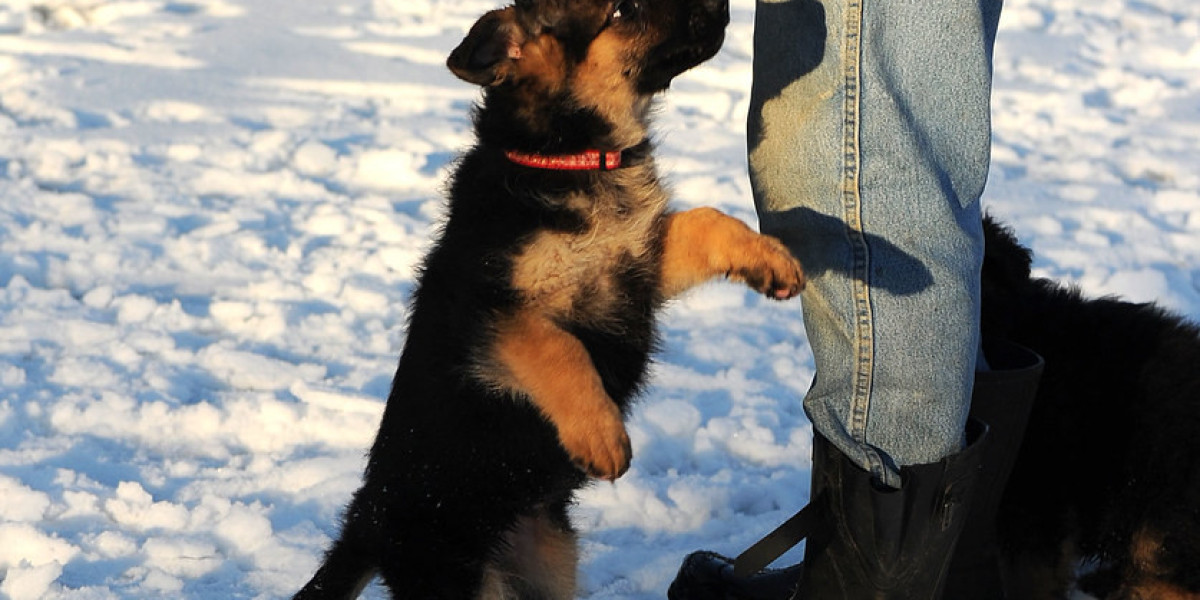German Shepherds make excellent service dogs for the police, military and other governmental agencies. They are intelligent and loyal, as well as protective. They are also extremely active and require lots of exercise and stimulation.
 Their natural protectiveness can manifest as aggression towards strangers, so early training and socialization are crucial. They may also exhibit compulsions such as repetitive behaviors such as tail following.
Their natural protectiveness can manifest as aggression towards strangers, so early training and socialization are crucial. They may also exhibit compulsions such as repetitive behaviors such as tail following.Health
German Shepherds generally have good health however, good breeding practices can help lower the risk of certain diseases. Breeders who are reputable check parents to ensure they are not passing on preventable issues, such as hip dysplasia and degenerative myelopathy to puppies.
Regardless of their breeding history, all puppies must be examined by a vet before they go to their new homes. This allows the veterinarian to determine and treat any health issues as soon as possible to avoid complications and improve outcomes.
When it is about the health of your German Shepherd dog, regular veterinarian visits are crucial. Regular veterinary examinations, vaccinations, and other preventive measures can help your pet live long and happy.
Certain health issues specific to German Shepherds include autoimmune disease, hemangiosarcoma, epilepsy/seizure disorders and bleeding conditions. These ailments can be treated and prevented by consuming the correct diet, avoiding table food and treats, and starting preventive treatment as soon as is possible.
All dogs can suffer from gastrointestinal issues, including diarrhea, vomiting, and weight loss. This could be caused by eating the wrong food, food allergies or underlying medical conditions. High-quality commercial food regular urination, water consumption and limiting sweets can ease digestive issues.
German Shepherds are prone to bloat (also known as gastric volvulus or GDV) due to their deep, narrow chests. This condition occurs when gas is absorbed by the stomach and then twists around itself, severing the blood supply and resulting in death if left untreated. GDV symptoms include heaving, retching but not swallowing. They also include an enlarged stomach, restlessness, and a lack of energy. The use of preventive surgery to suture or tack the stomach to reduce the chance of contracting this deadly disease.
German Shepherds aren't immune to dental disease. In the absence of treatment, tartar can cause gum disease and infections at the root of teeth. Eventually, your German Shepherd may lose her teeth or require extensive and expensive treatment, which could be difficult on your pet emotionally as well as financially.
Training
German Shepherds are intelligent herding dogs that have been used extensively as protection, service and police dogs. They are athletic, active and highly capable of training. They are an ideal fit for people who are active and have plenty of time to devote to training, exercising and removing hair that has fallen out. They are also good for people who want to have a loyal high-performing friend.
A well-trained German Shepherd is a reliable companion for all family members. This includes children and older adults. They are protective of their loved ones and may not be comfortable with strangers. These dogs are most effective with fair, firm, and consistent methods of training. They also need a lot of stimulation in their minds, so it is crucial to provide a variety of puzzles and games for training.
When shopping for a German Shepherd puppy, look for a breeder who cares about the quality of their puppies and wants to communicate with you. They should be able to show you the mother, litter as well as their health history as well as the environment in which they were raised and will be able to answer all your questions. They will also be able to tell you how the puppies were socialized and how they compare with their siblings.
Be cautious of puppies that are available at pet stores, since they are more likely to be from breeders who are reputable. They are usually produced to earn money and may be suffering from serious genetic issues. A reputable breeder will screen their breeding stock in order to prevent hereditary disease and other health issues from arising in the pups.
It is essential to begin training your puppy as quickly as possible, regardless of the breed you select. Teach basic commands such as sit, stay, and down. Also, work on leash training to ensure that your German Shepherd is at peace when you are out and wandering around. Early obedience training is important to stop them from chasing anything that moves. Engaging in some recall exercises is an excellent way to get them involved in their natural herding instincts too.
Make sure you spend a lot of time with your German Shepherd when they are young so that they learn to love being with you. This is important as the period of socialization lasts until they reach 16 weeks old. After that, they might be less open to new people, places, and experiences.
Care
No matter where you buy your German Shepherd, he will require ongoing care. This includes annual veterinary visits and vaccinations, as well as preventive medications ($700-$1200 annually). You'll also have to pay for grooming appointments as well as pet food and a yearly pet insurance policy ( $250-$300 annually). Think about the additional costs associated with dog walker, boarding and professional obedience training. This can add up to thousands of dollars over the course of your puppy's life.
Find a breeder who adheres to high standards and uses good breeding practices. Ask the breeder for evidence of hip dysplasia and elbow dysplasia testing for both the mother and the father and temperament testing for the litter.
Ask local veterinarians, German Shepherd owners and dog trainers and groomers for recommendations. These people regularly interact with animals and know how to breed ethically.
Although a German shepherd's instinct to herd can cause him to leap and chase people however, he will react to training and discipline. Introduce your family members as he grows. German Shepherds are extremely attached to their families and require lots of socialization.
Dogs are susceptible to dental diseases. It starts with tartar buildup and progresses to infection of the gums and the teeth's roots. It's a common problem that can lead to the loss of teeth and serious complications such as liver, kidney and heart disease.
Cancer is another concern particularly in older dogs. Hemangiosarcoma is a form of cancer that develops blood-rich tumors that are usually found in the spleen and heart. Other cancers include lung bone and intestinal.
Retrieving a German Shepherd from shelters is an alternative for those who cannot afford the expense of buying a purebred dog. The shelter's staff can help you choose a dog that has a good temperament and that will fit with your lifestyle. Adopting a pet is less expensive than buying one. Adoption fees typically include initial medical exams and vaccines, as well spaying or neutering. The staff at the shelter can offer advice on how to prepare your home for a new puppy by making sure your home is secure and removing any items that could be chewed on or ingested.
Exercise
German Shepherd puppies are incredibly active and need to have an outlet for their energy. If they don't get enough exercise this can lead to them being restless and redirected that energy into something undesirable like digging around in the yard or chewing on whatever is in reach.
You can also expose them to a variety of types of people, places, and situations while they are young. This will help them understand that not everyone is a threat. You can do this by taking them on walks and to the parks, engaging in playtime with neighbors or going to places they've not been before.
Aside from getting out and socializing It's also a great idea to include obedience training into your exercises. This can be something as simple as teaching your dog to sit on his mat. It can be more complicated than doing heelwork or playing games of recall.
Dog sports such as agility or flyball are excellent for your German Shepherd pup and can also aid in improving their mental abilities. Start slowly, so as not to overexert the puppy. Be sure to avoid engaging your German Shepherd in extreme weather conditions, as this could lead to heat-related illness in young dogs.
Aside from these kinds of activities, it's also recommended to take your German Shepherd puppy for daily walks. It's important for them to get some physical exercise and to explore the world outside of their home. It's essential to take them to different locations so that they can explore new sounds and surroundings.








